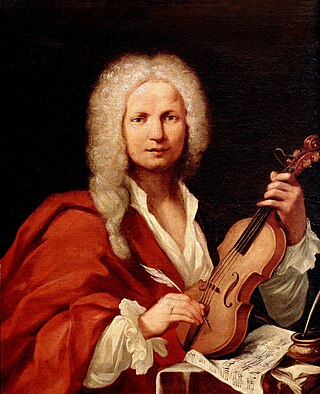
Antonio Lucio Vivaldi was a Venetian composer, virtuoso violinist and impresario of Baroque music. Along with Johann Sebastian Bach and George Frideric Handel, Vivaldi is regarded as one of the greatest Baroque composers and his influence during his lifetime was widespread across Europe, giving origin to many imitators and admirers. He pioneered many developments in orchestration, violin technique and programmatic music. He consolidated the emerging concerto form into a widely accepted and followed idiom.

Pietro Antonio Domenico Trapassi, better known by his pseudonym of Pietro Metastasio, was an Italian poet and librettist, considered the most important writer of opera seria libretti.
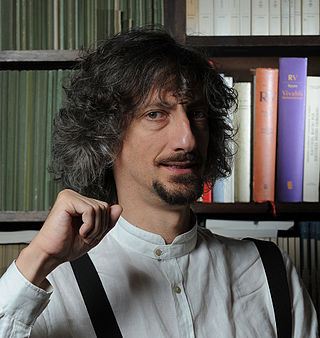
Federico Maria Sardelli is an Italian conductor, historicist, composer, musicologist, comic artist, and flautist. He founded the medieval ensemble Modo Antiquo in 1984. In 1987, Modo Antiquo also became a baroque orchestra, debuting with the performance of Jean-Baptiste Lully's Ballet des Saisons in front of an audience of about five thousand.

Antonio Caldara was an Italian Baroque composer.
The year 1729 in music involved some significant events.
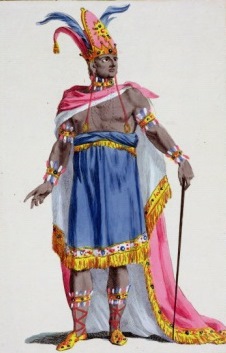
Motezuma, RV 723, is an opera in three acts by Antonio Vivaldi with an Italian libretto by Alvise Giusti. The libretto is very loosely based on the life of the Aztec ruler Montezuma who died in 1520. The first performance was given in the Teatro Sant'Angelo in Venice on 14 November 1733. The music was thought to have been lost, but was discovered in 2002 in the archive of the music library of the Sing-Akademie zu Berlin. Its first fully staged performance in modern times took place in Düsseldorf, Germany, on 21 September 2005.
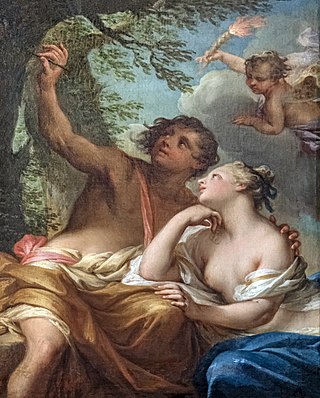
Orlando, usually known in modern times as Orlando furioso, is an opera in three acts by Antonio Vivaldi to an Italian libretto by Grazio Braccioli, based on Ludovico Ariosto's epic poem Orlando Furioso. The first performance of the opera was at the Teatro San Angelo, Venice, in November 1727. It is to be distinguished from an earlier Vivaldi opera of 1714, Orlando furioso, set to much the same libretto, once thought to be a revival of a 1713 opera by Giovanni Alberto Ristori but now considered by Vivaldian musicologists to be a fully-fledged opera by Vivaldi himself.

L'Olimpiade is an opera libretto in three acts by Metastasio originally written for an operatic setting by Antonio Caldara of 1733. Metastasio’s plot vaguely draws upon the narrative of "The Trial of the Suitors" provided from Book 6 of The Histories of Herodotus, which had previously been the base for Apostolo Zeno's libretto Gli inganni felici (1695). The story, set in Ancient Greece at the time of the Olympic Games, is about amorous rivalry and characters' taking places to gain the loved one. The story ends with the announcement of two marriages.

Farnace is an opera by Italian composer Antonio Vivaldi, set to a libretto by Antonio Maria Lucchini initially set by Leonardo Vinci during 1724. Vivaldi's setting received its first performance in 1727 at the Teatro Sant'Angelo in Venice. Popular at the time, and revived with great success at the Sporck theater in Prague in 1730, Vivaldi's Farnace slipped into oblivion until the last quarter of the 20th century when it emerged from obscurity.
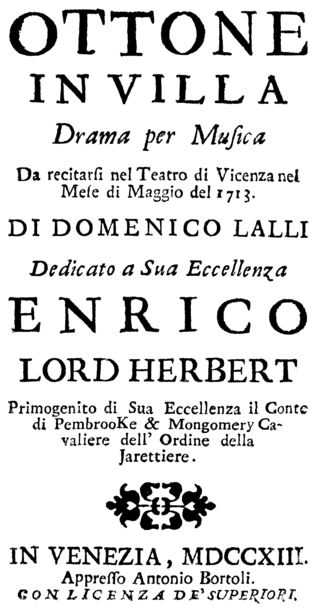
Ottone in villa is an opera in three acts by Antonio Vivaldi to an Italian libretto by Domenico Lalli. It was Vivaldi's first opera and premiered on 17 May 1713 at the Teatro delle Grazie in Vicenza. Lalli's pastoral drama is set in ancient Rome and was a condensed adaptation of Francesco Maria Piccioli's satirical libretto for Carlo Pallavicino's opera Messalina (1679). However, Lalli changed several of the characters in Piccioli's libretto. Messalina became an invented character, Cleonilla. Emperor Claudius became another Roman emperor, Otho (Ottone), who had already appeared as a protagonist in Monteverdi's L'incoronazione di Poppea (1642) and in Handel's Agrippina (1709).

Argippo is an opera libretto by Domenico Lalli, which in Giovanni Porta's setting premiered in Venice in 1717. Claudio Nicola Stampa's reworked version of the libretto was set as L'Argippo by Andrea Stefano Fiorè. This opera was performed in Milan in 1722.

Scanderbeg is an opera in three acts composed by Antonio Vivaldi to an Italian libretto by Antonio Salvi. It was first performed at the Teatro della Pergola in Florence on 22 June 1718 to mark the re-opening of the theatre to public performances. While the libretto has been preserved, only fragments of the original score remain.

Catone in Utica is an opera libretto by Metastasio, that was originally written for Leonardo Vinci's 1727 opera. Following Vinci's success, Metastasio's text was used by numerous composers of the baroque and classical eras for their own operas, including Pietro Torri (1736), Antonio Vivaldi (1737), Giovanni Battista Ferrandini (1753) and J. C. Bach (1761).
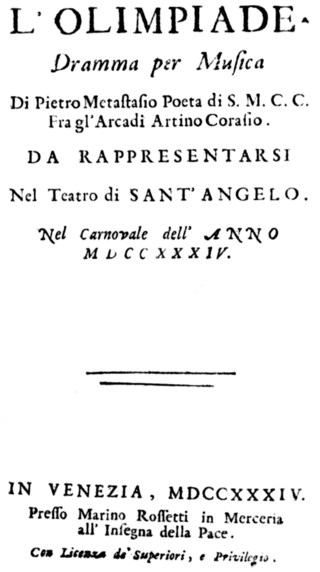
L'Olimpiade is a dramma per musica in three acts that was composed by Antonio Vivaldi. The opera uses an Italian libretto by Pietro Metastasio that was originally written for Antonio Caldara's 1733 opera of the same name. Vivaldi's version premiered in Venice at the Teatro Sant'Angelo on 17 February 1734. The same libretto was to be later set to music by over 50 other composers, including Giovanni Battista Pergolesi in 1735.

Antonio Vivaldi wrote a set of twelve sonatas for violin and basso continuo, Op. 2, in 1709. First published by Antonio Bortoli in Venice in 1709, the collection was later reprinted by Estienne Roger in Amsterdam around 1712/13.
La pravità castigata is a 1730 pastiche with music by multiple composers and an Italian language libretto by Antonio Denzio. It is the first 18th-century opera based on the Don Juan legend. It was also the first opera ever produced that retains the original setting and at least some of the original character names derived from early 17th-century dramatic prototypes of the Don Juan legend, the most important of which is Tirso de Molina's play El burlador de Sevilla y convidado de piedra. La pravità castigata was originally performed during Lent of 1730 in the opera theater of Franz Anton von Sporck in Prague, then revived with new music by Eustachio Bambini in Brno in 1734. The Brno performance was regarded as the original production for decades, and a published transcription of the libretto identifies it incorrectly as an anonymous text first performed in Brno.
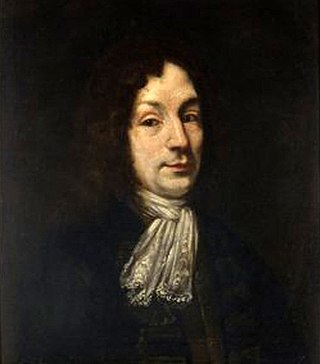
Luca Antonio Predieri was an Italian composer and violinist. A member of a prominent family of musicians, Predieri was born in Bologna and was active there from 1704. In 1737 he moved to Vienna, eventually becoming Kapellmeister to the imperial Habsburg court in 1741, a post he held for ten years. In 1765 he returned to his native city where he died two years later at the age of 78. A prolific opera composer, he was also known for his sacred music and oratorios. Although his operas were largely forgotten by the end of his own lifetime and most of their scores lost, individual arias as well some of his sacred music are still performed and recorded.
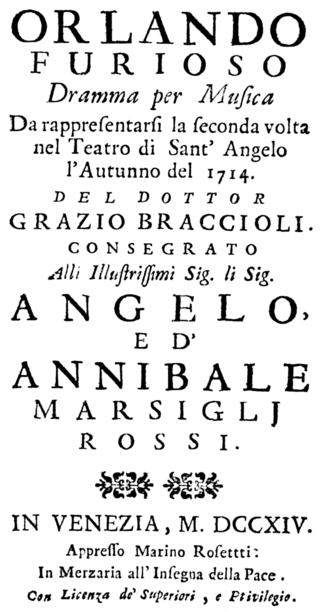
Orlando furioso RV 819 is a three-act opera surviving in manuscript in Antonio Vivaldi's personal library, only partly related to his better known Orlando furioso of 1727. It is a recomposition of an Orlando furioso written by Giovanni Alberto Ristori which had been very successfully staged by Vivaldi and his father's impresa in 1713, and whose music survives in a few fragments retained in the score of RV 819. Therefore, Vivaldi's first cataloguer Peter Ryom did not assign the opera a RV number, but catalogued it as RV Anh. 84. The libretto was by Grazio Braccioli.

Sebastiano Biancardi, known by the pseudonym Domenico Lalli, was an Italian poet and librettist. Amongst the many libretti he produced, largely for the opera houses of Venice, were those for Vivaldi's Ottone in villa and Alessandro Scarlatti's Tigrane. A member of the Accademia degli Arcadi, he also wrote under his arcadian name "Ortanio". Lalli was born and raised in Naples as the adopted son of Fulvio Caracciolo but fled the city after being implicated in a bank fraud. After two years wandering about Italy in the company of Emanuele d'Astorga, he settled in Venice in 1710 and worked as the "house poet" of the Grimani family's theatres for the rest of his career. In addition to his stage works, Lalli published several volumes of poetry and a collection of biographies of the kings of Naples. He died in Venice at the age of 62.

Grosso mogul, also Il grosso mogul, or capitalised [Il] Grosso Mogul, RV 208, is a violin concerto in D major by Antonio Vivaldi. The concerto, in three movements, is an early work by the Venetian composer. Around the mid-1710s Johann Sebastian Bach transcribed the concerto for organ, BWV 594, in C major. A simplified version of the violin concerto, RV 208a, without the elaborated cadenzas that appear in manuscript versions of RV 208, and with a different middle movement, was published around 1720 in Amsterdam as concerto #11 of Vivaldi's Op. 7.















